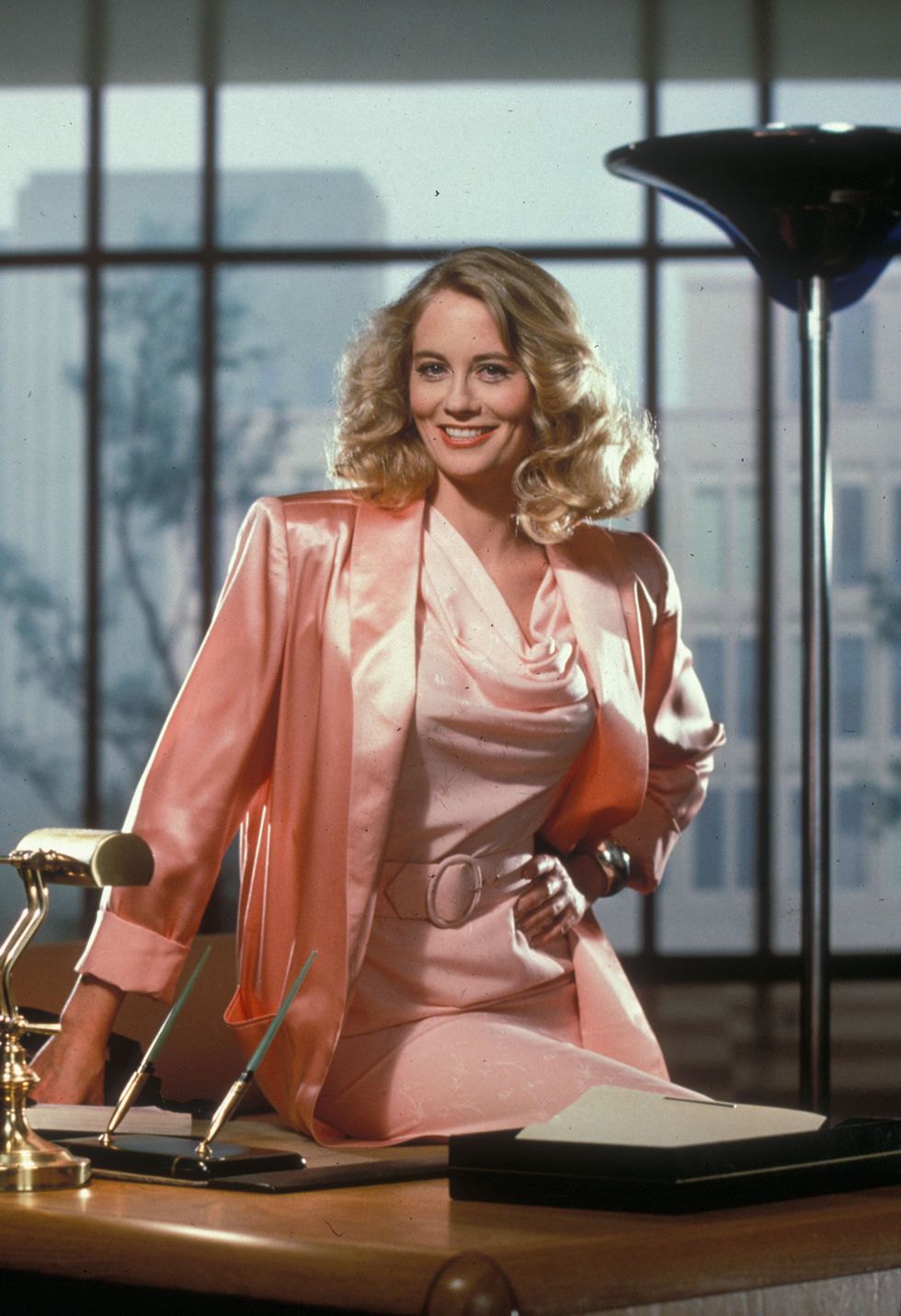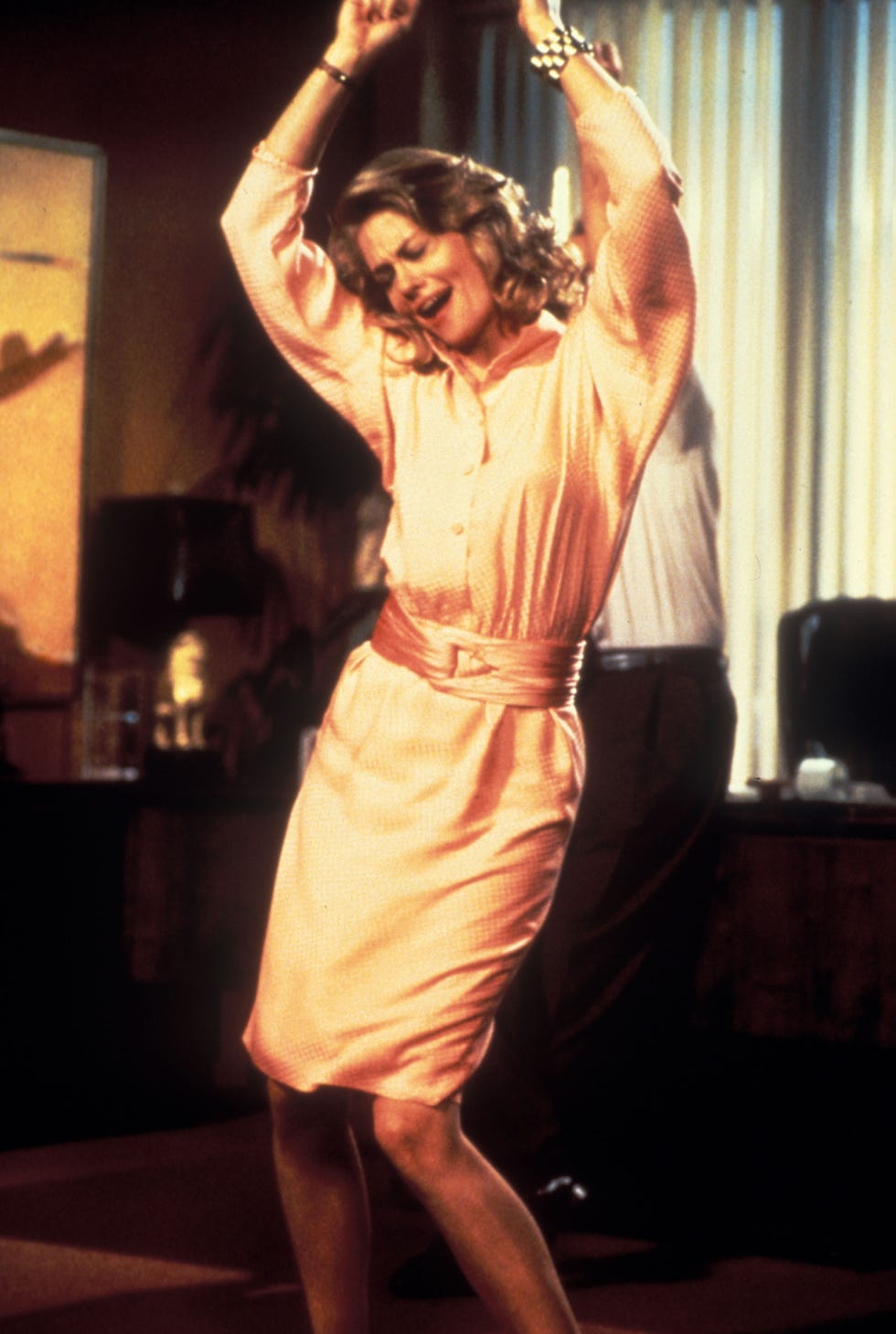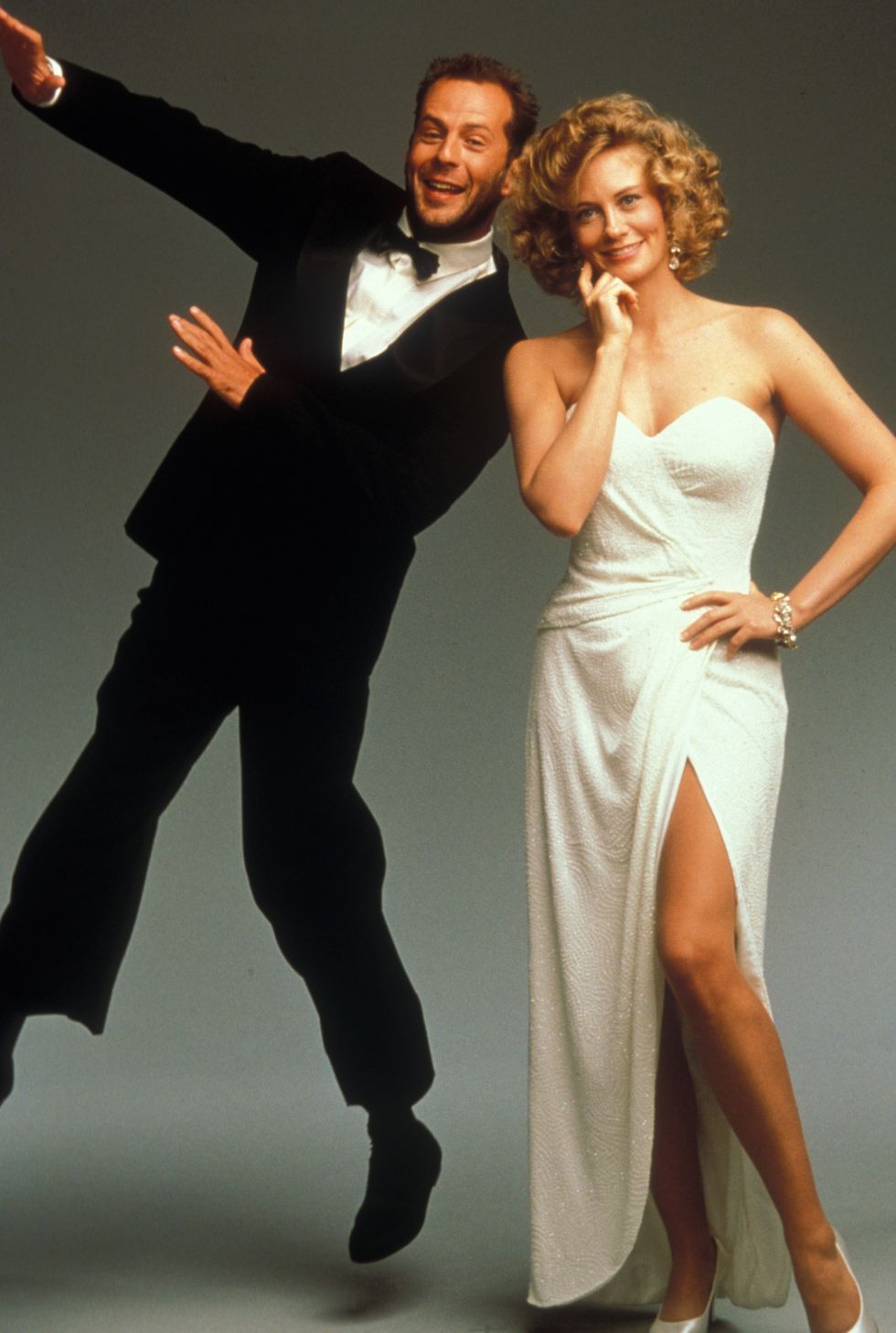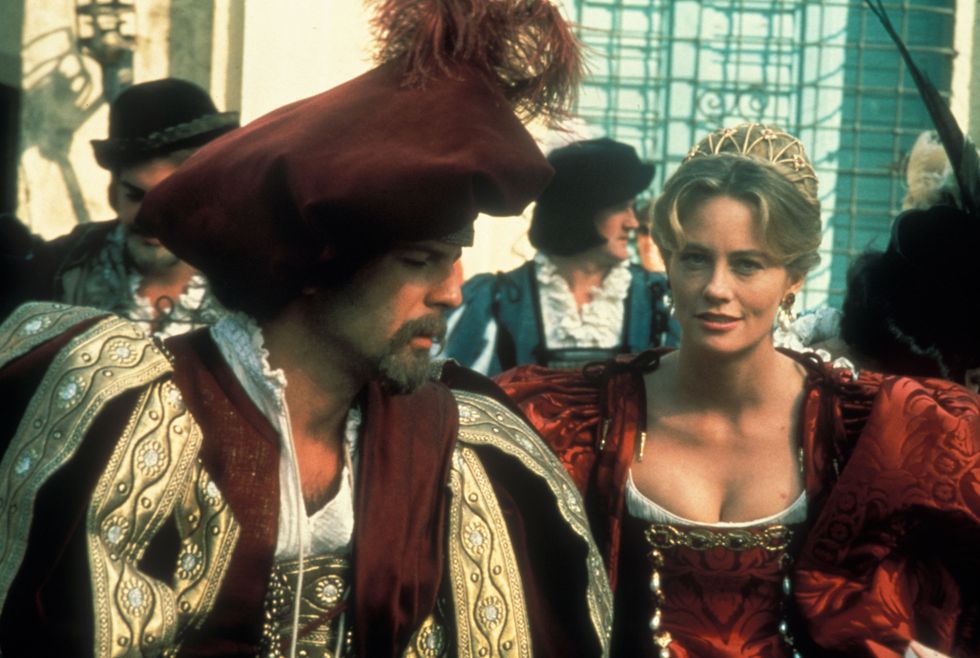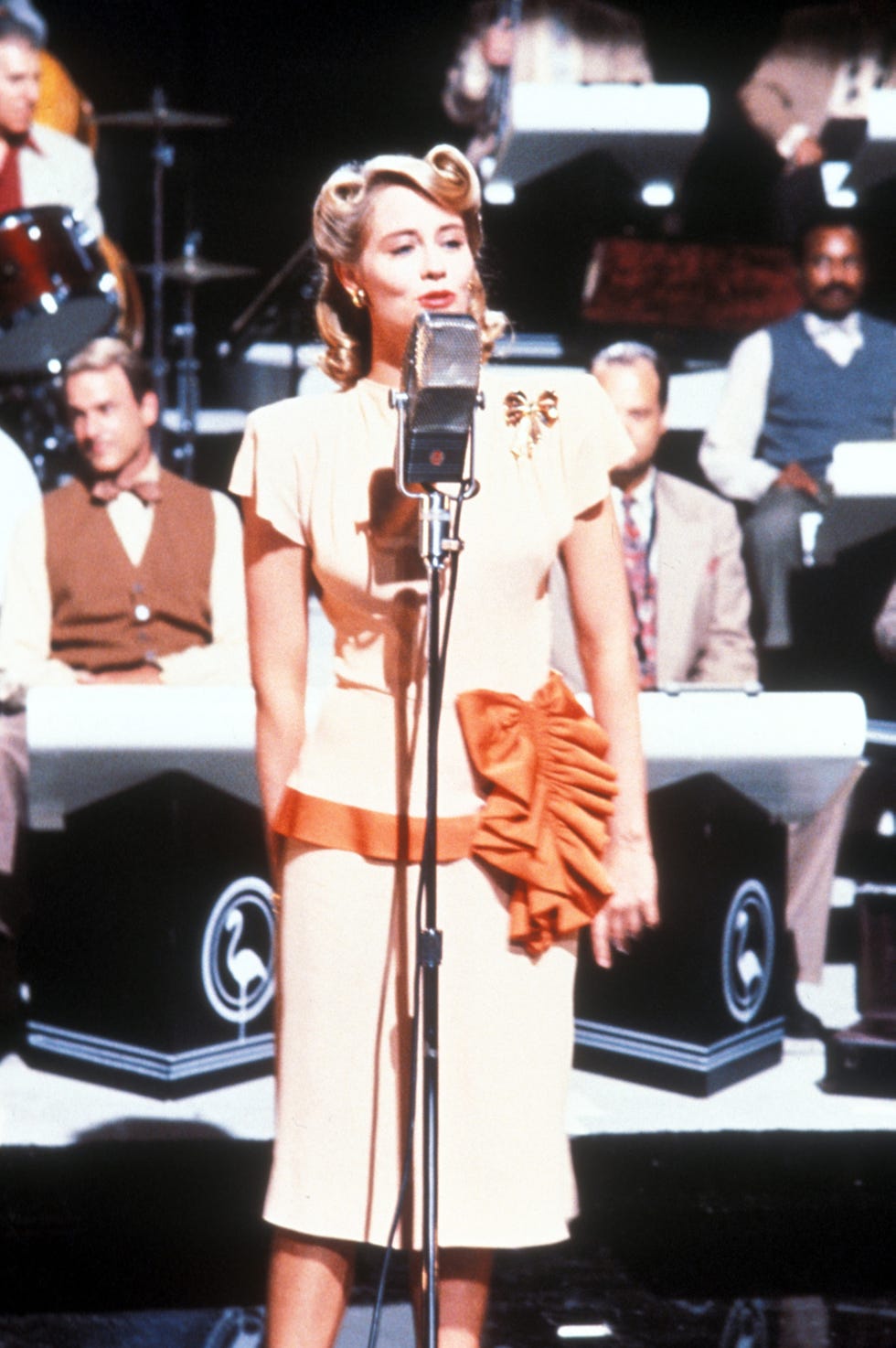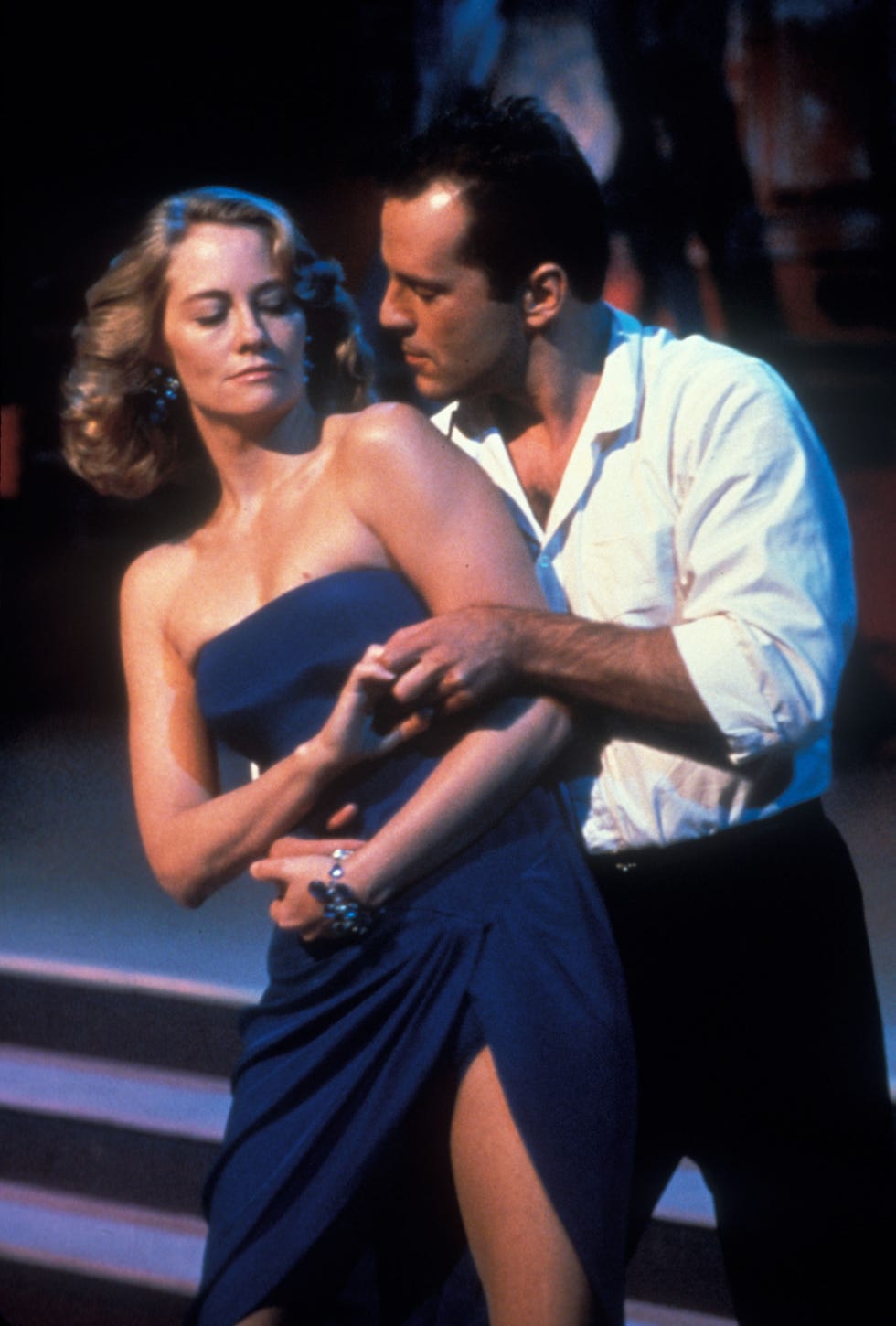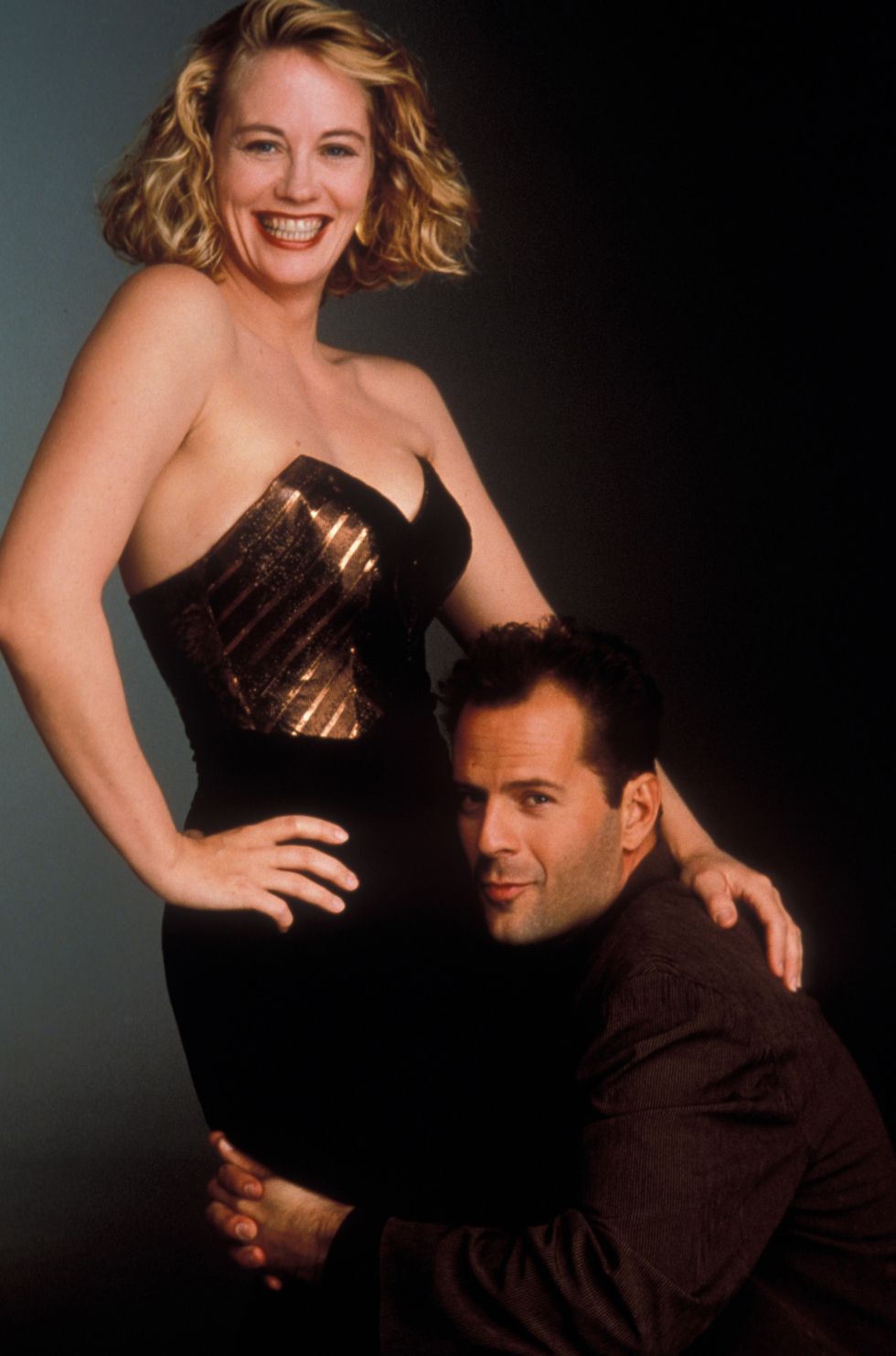Style Points is a weekly column about how fashion intersects with the wider world.
For years, Moonlighting has existed as a secret handshake. Fans have either had to trade DVD box sets of the classic ’80s show or bid for them on eBay. Until this month, that is, when Hulu announced the series would be streaming for the first time ever.
There’s much to love about Moonlighting, from the fastball-quick dialogue to the crackling chemistry between stars Cybill Shepherd and Bruce Willis. But the show’s fashion, particularly in the context of 2023’s power dressing moment, feels more relevant than ever, despite being old enough to have a tidy sum socked away in a 401(k).
When the detective-agency comedy came on the air in 1985, ABC was best known for glossy, soapy Aaron Spelling productions like Dynasty. Moonlighting was never as high-camp as its network neighbors. Instead, it took visual (and script) cues from Golden Age screwball comedy and film noir—Howard Hawks, Preston Sturges, and numerous Raymond Chandler adaptations—and translated it for the upwardly mobile yuppie era. Costume designer Robert Turturice was the man behind the style onscreen. (His other credits include Batman & Robin, Beaches, and Gia; he passed away in 2009.)
As with its noir ancestor The Big Sleep (a film whose plot Raymond Chandler didn’t even understand), Moonlighting’s mysteries of the week (and the murkier mystery of the Blue Moon Detective Agency’s financial viability) are never really the point. The show is about the supremacy of style, whether that’s a finely-tuned wisecrack or a stunningly decorated set. Turturice immediately grasped the postwar-meets-postmodern slant of the show, with its screwball DNA and very of-the-moment breaking of the fourth wall, in which the characters might cut short their His Girl Friday bickering to mention an upcoming commercial break.
“To say that Robert was the captain of his own ship would be understating it,” Moonlighting creator Glenn Gordon Caron says. “He was someone that you trusted,” not simply for his taste, but because of his intuition. “You could say to him, and I often did, ‘She’s a Hurrell photograph,’” referring to the Old Hollywood studio photographer, “and he would understand. But what was great about him was [that] he wasn’t there to do what you told him to do. He was there to listen to what you said, and then improve upon it.” The show’s meta nature “required heightening, so that the audience could feel the wink and understand, ‘There’s a certain amount here that we want you to take seriously, and there’s another amount that we really don’t expect you to.’ The wardrobe helped make that statement.”
Still, the characters needed to be more earthbound than the diamond-frosted stars of the nighttime soaps. “We always had fun with Bruce, walking around in his boxer shorts and T-shirt, and likewise, [Shepherd’s character] Maddie waking up, her hair a bit a mess, because we wanted the characters to seem [like] archival images, but at the same time, ‘Here’s what they look like at home,’ because that made them a little more accessible,” Caron says. “They weren’t Joan Collins. These were people who were constantly aware of the fact that Cybill’s character needs to make money.”
Shepherd’s wardrobe stands out as the most contemporary-feeling among the cast, thanks to its collision of strong-shouldered silhouettes with soft pastel shades and sinuous silks. Maddie’s looks wouldn’t be out of place in a collection from The Frankie Shop today. Her aesthetic sits at the halfway point between power dressing and Backlash-style hyper-femininity. She’s a proto-girlboss who was favoring millennial pink when millennials were still in diapers; Willis’ character even cracks a joke about the prevalence of mauve at the time. In the ’80s, women were entering the corporate workforce in droves, and, says Caron, “it was almost as if they were putting on extra armor. Cybill’s wardrobe certainly reflected that.” Shepherd, a former model whose real-life magazine covers are displayed on the show, had one big piece of fashion input: “She hated having to wear heels. She was constantly trying to find a way to dodge that.”
Willis’ onscreen style had a similar hybrid feeling to it. “It very much had that ’80s vibe, but at the same time, echoed back to that ’40s noir silhouette. And, luckily, Bruce put out a certain amount of that even without the clothes. He had something. I remember when I first saw him, I went, ‘Oh my goodness. He’s from another time. He’s an old soul.’”
The indie “It” girl of the group was receptionist Agnes DiPesto, played by Allyce Beasley in a wardrobe of mismatched, vintage-feeling pieces, shawls, and funky jewelry. “I had always seen the character as provincial, in that way that people in New York, the most vibrant city in the world, can be provincial, which is to say that even though they’re in this place where you’re constantly coming into contact with people from all over the world, their worldview is rather narrow and kind of charming,” Caron says. “Everything she wore looked like it had been worn three, four, five, 10 times before. Whereas most of what Cybill wore looked like it had never been worn before. Robert took what Allyce was doing and turned it into textures and colors.”
Curtis Armstrong, who played temp-turned-employee Bert Viola, was conceived as the “off-the-rack version of Bruce,” in the style of the now-defunct bargain store Alexander’s. “You could go in and for $22, you’d be able to buy a sport jacket made of some fabric that doesn’t exist in nature, and it would look good for three hours,” Caron says. “These were all people that were striving; they all wanted something better than where they were, except for Cybill’s character, who wanted to get back to where she was. It was very much about class, on a certain level.”
As rich as the characters’ work wardrobes were, more highly stylized sequences and episodes allowed the creative team to stretch their ingenuity. “Our show was never monotonous,” Caron says. “Bruce used to come in every week and go, ‘What are we doing this week, boss?’” “Atomic Shakespeare,” a retelling of The Taming of the Shrew which required the cast and scores of extras to be dressed in Elizabethan finery, was one such landmark. In an oral history of the episode. Shepherd told Vanity Fair, “Those costumes must have weighed thirty pounds, and they itched.”
“At the time, I think it was probably one of the most expensive episodes of television ever made, and we had musical numbers. It was just nuts,” says Caron, adding that Turturice was all in. “He was one of these people who, if you let him, would build everything.” Ultimately, the episode won the costume designer an Emmy.
“The Dream Sequence Always Rings Twice” is another hallmark episode, featuring 1940s-era flashbacks and an appearance from Orson Welles. Turturice drew on Rita Hayworth in Gilda for Shepherd’s glamorous chanteuse character. Then there was “Big Man on Mulberry Street,” featuring an original song by Billy Joel and a dream ballet. “I realized it was an opportunity to do storytelling through dance,” says Caron, who enlisted Stanley Donen (Singing in the Rain)to direct.
All of this was happening at a time when TV, as a medium, was not nearly as respected as film. (And also, in the pre-streaming days, it felt far more ephemeral.) “Back then, if you wanted to do those sorts of things, people looked at you like, ‘What’s wrong with you?’” Caron says. “‘Why are you devoting all this passion, energy, and hopefully artfulness to something that isn’t worthy of it?’”
The fact that many viewers are discovering the show now is, of course, “a little bittersweet because of everything that Bruce is going through,” says Caron. (Willis retired from acting last year due to aphasia, and has since been diagnosed with frontotemporal dementia.) “Part of the fun for me was always, ‘There’s a whole one or two generations of people that only know Bruce as the guy who carries a gun and kicks out windows.’”
With the renewed interest in the series, would Caron ever consider doing a reboot? “For years I wouldn’t even entertain the idea, because I thought, it’s going to be difficult to do something as well as it was done the first time.” He would also want to “find a way to do it that would also honor Bruce and Cybill’s performances. Now that Bruce is no longer acting, it’s hard to figure it out, but I toy with it from time to time. I’m not sure that I would do a literal reboot, in the sense that it is these same two characters in 2023. I might do a show that takes place in the same universe and that has certain dynamics that are similar. We’ll see if it ever actually happens. I’m equally excited by it and afraid, so it may never happen.” Luckily, we have five seasons to content us in the meantime.

ELLE Fashion Features Director
Véronique Hyland is ELLE’s Fashion Features Director and the author of the book Dress Code, which was selected as one of The New Yorker’s Best Books of the Year. Her writing has previously appeared in The New York Times Magazine, The New Yorker, W, New York magazine, Harper’s Bazaar, and Condé Nast Traveler.


